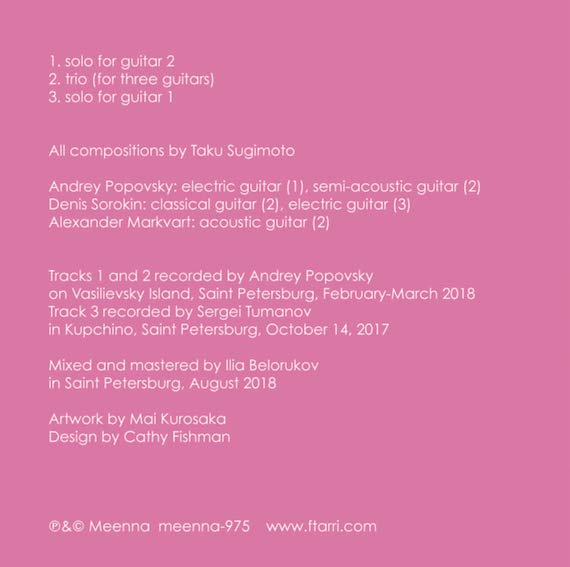

CD
meenna-975
Limited edition of 300
Out on July 14, 2019
Purchase price in Japan: 1,500 yen (tax not included)
(For purchase outside of Japan, prices vary.)
Andrey Popovsky: electric guitar (1), semi-acoustic guitar (2)
Denis Sorokin: classical guitar (2), electric guitar (3)
Alexander Markvart: acoustic guitar (2)
All composed by Taku Sugimoto
Tracks 1 and 2 recorded by Andrey Popovsky on Vasilievsky Island, Saint Petersburg, February-March 2018
Track 3 recorded by Sergei Tumanov in Kupchino, Saint Petersburg, October 14, 2017
Mixed and mastered by Ilia Belorukov in Saint Petersburg, August 2018
Artwork by Mai Kurosaka
Design by Cathy Fishman
Taku Sugimoto is a Tokyo-based guitarist and composer. Improvisation is one aspect of his work, but currently his main activities are composing and performing composed pieces (including those of other composers). He continues his global and concentrated interaction with composers from around the world, particularly those closely connected with Wandelweiser. Ftarri had previously released two albums under Sugimoto's name alone—Septet (2015) and Quintets: Berlin, San Diego (2017). On both CDs, his compositions are performed by other musicians (on Septet, Sugimoto also participates in the performance).
The CD Guitars, also released under Sugimoto's name, is comprised of three pieces that he wrote for that instrument. The first and third are guitar solos around 20 minutes long; the second is a guitar trio of about 10 minutes. The performers are three guitarists from Russia, and the pieces were recorded in St. Petersburg in 2017 and 2018. The solo compositions were performed by Andrey Popovsky (track 1) and Denis Sorokin (track 3); and the trio was performed by these two plus Alexander Markvart. All the performances are extremely simple and concise, but convey a feeling of complexity and richness. Abounding in an incomparable feeling of depth within their simplicity and candor, these are truly Sugimoto-like works.
All the tones of these 3 compositions for guitar(s) are played only with open strings ["solo for guitar 2" and "trio (for three guitars)"] or natural harmonics ("solo for guitar 1"), and all the tunings are respectively irregular.
The score of "solo for guitar 1" (2014-2015) shows 17 fragments or sections consisting of one or two melodies or bars. These fragments are played in any order and the number of repetitions of each melody or bar would be up to the performer: one person can play only one fragment throughout the performance. This composition has been played or recorded by Cristián Alvear, Denis Sorokin, and myself, and the interpretations are all quite different from one another. Denis's interpretation is wild and raw, and nevertheless very fascinating to me.
The tuning required for playing "solo for guitar 2" (2016) is so anomalous that it is impossible to play with a normally-tuned guitar. The interval between the 6th and 1st strings is a perfect fifth (G and D) and the other 4 strings are tuned to all different minor or major thirds (Bb or B): 1, 7/6, 6/5, 5/4, 9/7, 3/2.* The string used for the 6th string is the one which is normally used for the 3rd string. I chose a rather high register, because it is easier for me to tune the strings to pure intervals. While it is hard or troublesome to tune the strings for the composition, it is not difficult to play it. However, the performer's concentration is required. Andrey Popovsky's interpretation is plain, serene, and slow, which is surely what I intended.
"trio (for three guitars)" (2016) was composed for the concert that Tetuzi Akiyama, Cristián Alvear, and myself were to have. I never thought of writing a composition which needs anomalous tuning like "solo for guitar 2," since we had to play 2 or 3 other compositions besides mine. Then I got an idea that "it must be interesting to write a composition which is very simple to play but sounds similar to a solo piece like 'solo for guitar 2,' because there are three of us." Every guitarist plays only the 5th, 4th, and 3rd open strings, but each guitar is tuned differently, though all the 5th strings are tuned to A (see the score). I asked Denis if it would be possible to record the composition with electric, acoustic, and classical guitars, the same combination I did with Tetuzi and Cristián, or with three different types of guitars. The recording played by Denis, Andrey, and Sasha (Alexander Markvart) reminds me of something like imaginary folk music.
*All the tones of the recordings of "solo for guitar 2" and "trio" are almost exactly a semitone lower than written in the score, while the intervals between tones are alright. I thought I had suggested to Denis that he make the tuning a semitone lower to solve some practical matters, but Denis said that wasn't the case. What happened?
